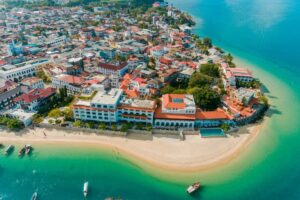Nairobi — Police in Tanzania guarding the North Mara Gold Mine have been linked to the killing of least six people and injury of several others during clashes since February 2024, Human Rights Watch said today. The Tanzanian authorities should promptly undertake independent and impartial investigations into the killings and other abuses in northern Tanzania’s Tarime district.
The police have accused those killed and injured of “invading the mine” and conducting illegal small-scale mining inside the mine’s premises. The police have made no arrests related to these abuses.
Ensure Independent Investigations; Prosecute Those Responsible
“The growing number of unaccounted for killings connected to Tanzania’s North Mara Gold Mine reflect a worrying pattern of impunity for abuses that needs to be addressed,” said Oryem Nyeko, senior Tanzania researcher at Human Rights Watch, “The Tanzanian authorities should not sweep these deaths under the rug but should ensure that those responsible are held to account.”
In 2014, the Tanzanian government entered into an agreement with the North Mara Gold Mine Limited company to guard the mine with up to 110 police officers, referred to as “mine police” by community members, on an ongoing basis. Rights groups and community members have reported that in the years since this agreement, police officers have been responsible for beating, shooting, torturing, and detaining without charge residents of areas near the mines and dumping areas. The police accuse the residents of theft from the mine and its surrounding waste rock dumping sites.
Barrick Gold, a mining company headquartered in Toronto, Canada, and the Tanzanian government have jointly owned the mine since 2019. The area is inhabited by Indigenous Kurya people who have conducted small-scale local mining on the land for centuries. In 2022, 21 Tanzanians sued Barrick Gold before a Canadian court, accusing the company of being complicit in extrajudicial killings and beatings of residents by police assigned to the mine. They alleged that the company converted the police operating in and around the mine “into a private and heavily armed security force.” A preliminary hearing in this case has been scheduled for October.
In the past four months several deaths and injuries have been reported for which no arrests have been made. The police reported that on February 28, Jackson Nyamonge, a 28-year-old resident of Nyamwaga village, was found dead at the mine fence with injuries to his chest and stomach. On April 7, local media reported that police shot Sylvester Sobhe Marwa Nyangige in the head during a security operation at the mine. A copy of a police form, seen by Human Rights Watch, cites “unnatural death” as the circumstances of his death. On April 26, police allegedly shot and injured Pascal Malembara in the leg in the Murwambe area.
On May 6, the police confirmed the death of Emmanuel Nyakorenga, a resident of Kewanja village, at a primary school near Nyabigena village, close to the mine. The police told the media that he was part of a group of people with “traditional weapons” who had attacked the police officers who were preventing them from unlawfully entering the mine.
A witness described the killing of Nyakorenga, telling Human Rights Watch that around noon police officers chased several people from an area near the mine’s Gokona pits into the Nyabigena Primary School playground, about 500 meters from the mine. The police allegedly shot tear gas, sound bombs, and live bullets at the group, injuring some.
Shortly after Nyakorenga was fatally shot, the officers fled and residents of the area began to block the main road near the school in protest of Nyakorenga’s killing. Police later returned and dispersed the crowd, using tear gas. Nyakorenga’s relatives said that a postmortem examination found what looked like a bullet in his head, but that the officials who conducted the exam did not provide them with further information.”
Since May 6, residents have reported the deaths of at least three other people in the area. The day after Nyakorenga’s death, residents reported that they found the body of an unidentified person at a mine dumping area outside the mine premises. On May 22, the media reported that Babu Christopher Iroga, a resident of Mjini Kati village, and July Mohali, a resident of Nyangoto village, were killed during a confrontation with police. The police accused the men of stealing from the mine.
John Heche, a former member of parliament for Tarime district, told Human Rights Watch that police abuses have intensified in the recent years, saying: “For a few years these deaths have been occurring, but never at this magnitude. People are being shot almost every day.”
Barrick Gold said in a June 11 response to a request for information from Human Rights Watch on June 4 that the company “does not, and cannot, have any de facto control over the police and their actions,” and that the “police are requested to enter the mine site to assist in upholding law and order” when their employees’ lives are in danger. The company said that it is “not in any way involved or aware of [Tanzania police force] activity in the community, nor can it be responsible or accountable for it simply because such activity occurs in geographical proximity to the North Mara Gold Mine.”
Barrick Gold’s human rights policy states that it does “not tolerate violations of human rights committed by our employees, affiliates, or any third parties acting on our behalf or related to any aspect of one of our operations,” and that it does its “utmost to avoid being complicit in adverse human rights impacts, including benefitting from the human rights violations caused by others.”
Under the United Nations Guiding Principles on Business and Human Rights, companies have a responsibility to avoid causing or contributing to human rights violations and to provide remedy to victims of abuses to which they have caused or contributed.
The UN Basic Principles on the Use of Force and Firearms by Law Enforcement Officials require police to use nonviolent means before resorting to force and firearms. While law enforcement officials have a duty to protect lives and property, they should only use force when unavoidable and in a proportionate manner, and use lethal force only when absolutely necessary to save lives.
“For years, residents of areas near Tanzania’s North Mara Gold Mine have complained about the brutality of the police,” Nyeko said. “The Tanzanian government should ensure independent and impartial investigations into these abuses so that the victims and their families receive justice.”
Source: allafrica.com














